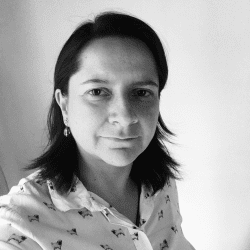Diana Ordoñez Castillo, PhD candidate, Universidad de Los Andes (Colombia)
Project title: Museums, Emotions, and Well-Being: Community-Based Museums of Memory in Colombia
Diana’s project focuses on community-based museums of memory and their relationship to victims, survivors, and family members overcoming he effects of conflicts and violent scenarios, to consolidate their rights to memory, justice and well-being. The hypothesis guiding this research is that these museums are tools for dealing with the direct impacts of violence, but, above all, they are a way of assembling long-standing organizational exercises demanding for profound social transformation. Therefore, Diana’s work is based on the following research question: how do the emotions, the notions of well-being and justice of the victims and survivors materialize in the creation and implementation of these community memory museums, and how do these processes dialogue with transitional justice?
This research is based on a multiple case study of two experiences that illustrate well the qualities of community memory museums in Colombia. One of these cases is the Museo Itinerante de la Memoria y la Identidad de los Montes de María 'El Mochuelo'. El Mochuelo is one of the projects of the Communications Collective of Montes de María - Línea 21 (hereafter Collective). The fieldwork for this research has allowed me to establish a partnership with this organization, which has grown to allow me to be considered part of the Collective and not an external researcher collecting data for her thesis. At present, in its seventh itinerancy since 2019, El Mochuelo carries out research on victimizing events throughout the region, brings together initiatives of weavers, artists, and independent professionals who arrange their volunteer work for the museum, and has become the way to gather economic and human resources to strengthen the communitarian endeavor.
Above all, El Mochuelo is the mechanism to reach groups of young people and women to generate spaces for training and reflection that allow them to become aware of their role as political actors, the value of their situated knowledge and the importance of their daily actions. My work as a committed researcher seeks to deepen and strengthen this capacity of the museum and the Collective.
This proposal includes two phases. Phase 1 includes activities required for the thesis like: workshops associated with the "Museums for Peace" project, focus groups with the core team of the Collective, with groups of women and young people who have participated in the museum, participation in the design of the traveling exhibitions of the museum, training workshops for the Collective's core team in museological theory, museographic strategies and mediation, and in-depth interviews: to complement the reflection on the key concepts of the thesis. Phase 2 consists on in depth training workshops for the Collective's core team, on topics such as: decolonial research methodologies, transitional Justice: retributive, restorative and transformative, feminist perspectives and gender approach, and critical perspectives of development. Overall, the aim of Diana’s project is to fill a gap caused by the elimination of the social studies course throughout the country.
Phase 2:
This project phase aims to address three key issues: 1) a lack of clarity regarding the sector's dimensions and characteristics, making negotiations with government entities challenging; 2) a limited understanding of the legal framework, public policies, and resource allocation within the sector; 3) constrained museum conceptions that disregard or even deny the transformative power of these initiatives. Activities in this new phase include: creating an inventory of initiatives and making the online database accessible through a repository of stories presented in podcast or video formats. Develop pedagogical materials in digital and video formats, along with an engagement campaign.
